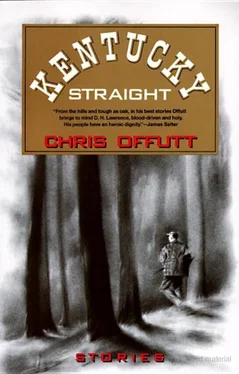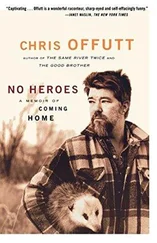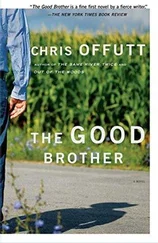Everybody laughed, even a couple of old women with hair buns like split pine cones. I decided to skip the mail and go home. Then the one boy made me mad.
“I got a sick pup at the house, Doctor. You as good on them as your daddy was?”
Way it is around here, I had to do more than just fight. Sometimes a man will lay back a year before shooting somebody’s dog to get back at its owner, but with everyone watching, I couldn’t just leave. I walked to their pickup and kicked out a headlight. The youngest Monroe came running but I tripped him and he rolled in the dirt. The other one jumped on my back, tearing at my ear with his teeth. His legs had a hold I couldn’t break. He kept hitting the side of my face. I fell backwards on the truck hood and he let go of me then. Two old men held back the other boy. I crossed the creek and climbed the steep hill home, spitting blood all the way.
Mom never said a word after she heard what the fight was over. Warren came by the next night.
“I got one at the creek and the other at the head of Bobcat Holler,” he said. “They’ll not talk that way no more.”
“Whip them pretty bad?”
“They knowed they was in a fight.”
Warren’d taken a lick or two in the jaw, and his neck vein was puffed out again. A railroad tie won’t knock him over.
“You still getting that GED?” he said.
“Friday.”
“I’m getting me a TV that runs on batteries.”
“What for?”
“To sit and look at.”
“Same with me, Warren. Same with me.”
He pushed his fingers at a swollen place below his cheekbone. His shoulders sagged. “I’ll fight for you, Junior. And for Daddy, too. But I never could figure what either of you ever was up to.”
He went outside and opened the truck door with his thumbs. The knuckles of both hands were split, and bending his fingers would open the scabs. One was already leaking a little. He started the truck in second gear so he wouldn’t have to shift, and drove away with his palms. I watched him till the dust settled back to the road.
On Friday I walked the ridgeline above the creek all the way to town. Rocksalt lay in a wide bottom between the hills. I’d never seen it from above and it looked pretty small, nothing to be afraid of. I went down the slope, crossed the creek, and stepped onto the sidewalk. For a long time I stood in front of the test center. I could leave now and never know if I passed or flunked. Either one scared me. I opened the door and looked in.
“Congratulations,” said the lady.
She handed me a state certificate saying I’d achieved a high school degree. My name was written in black ink. Below it was a gold seal and the governor’s signature.
“I have a job application for you,” she said. “It isn’t a promise of work but you qualify now. Employment is the next step out.”
“All I wanted was this.”
“Not a job?”
“No, ma’am.”
She sighed and looked down, rubbing her eyes. She leaned against the doorjamb. “Sometimes I don’t know what I’m doing here,” she said.
“None of us do,” I said. “Most people around here are just waiting to die.”
“That’s not funny, Junior.”
“No, but what’s funny is, everybody gets up awful early anyhow.”
“I like to sleep late,” she said.
She was still smiling when I shut the door behind me. I’d come as close as a man could get to finishing school and it didn’t feel half bad. At the edge of town I looked back at the row of two-story buildings. Dad used to say a smart man wouldn’t bother with town, but now I knew he was wrong. Anybody can go there any time. Town’s just a bunch of people living together in the only wide place between the hills.
I left the road and walked through horseweed to the creek bank. It was a good way to find pop bottles and I still owed the state fifteen dollars.

Rain chewed fresh gullies in the ridge road, turning the hard clay dirt to a yellow paste. The ditch overflowed and gray air blurred the low horizon. Dripping leaves hung limp and heavy.
“It’ll pass,” Mercer said.
Coe lit a cigarette and opened the pickup window an inch. Pellets of rain spattered his shoulder. The top of the windshield was breath-fogged from an hour of waiting and watching the rain. The truck cab smelled dog wet.
“Hope how soon that dozer comes,” Mercer said. “You?”
Coe didn’t answer. Finger marks of mud streaked the brim of his cap. He was from out of the county, where Mercer’s brother had bought a used mobile home. Earlier that morning, Coe and his boss had the trailer hauled halfway up the slope when rain turned the fresh-cleared earth to swamp. The trailer sank past the axles. The tow truck buried its rear tires, trying to pull the trailer free. Neighbor men who’d come to watch laughed and laughed. They were waiting for the wet earth to pitch the trailer down the hill into the creek. Maybe the tow truck would follow, like a bluetick chained to a dog box. The men would wait all day for that. It was worth the rain and chill.
“This ain’t bad,” Mercer said. “Setting in a truck for pay. How long you had this job?”
“Three months.”
“Like it?”
“No.”
“If it was me, I’d like it,” Mercer said. “How come you don’t?”
Shifting wind drilled water against the roof. Coe tossed his cigarette out the window, where rain slammed it down and gutted it. Coe watched the tobacco and paper vanish, wondering how people could live on vertical land. No sky. No river. Nothing but shacks, mud, and woods so dense Coe couldn’t see past the tree line. The midday air was dark as dusk. He’d heard that every hillbilly had one leg shorter than the other from years of walking on the slant.
“Before this,” Coe said, “had me a job six years on a horse farm.”
“Good work if you can get it.”
“Not too awful bad. Helped the vet till my wife’s cousin died. Told the big boss I was going to the funeral and he said not to come back.”
“First cousin?”
Coe nodded.
“What’d you do?”
“Went.”
“Got to stand by family,” Mercer said. “Man like that ain’t worth working for.”
“No,” Coe said. He twisted against the truck door to face Mercer full on. “But some people don’t like niggers.”
Mercer leaned forward, squinting, head cocked.
“Hear that dozer,” he said. “Halfway up the hill, my opinion.” He looked at the water drenching the land. “Some people don’t like nothing.”
Two rain-dark figures rode the rumbling bulldozer to the top of the hill; Coe waved it out the ridge and followed in the truck. The dozer punched black smoke into the mist as it stopped beside an old hickory. Several men squatted beneath the tree, their arms extended, elbows propped on bony knees. They waited in the rain as if it was sun, oblivious to the wet and the cold. Water glazed their faces to a uniform mask.
Only Mercer’s brother stood. Aaron weighed three hundred pounds and was freshly married. For two weeks Mercer had helped him clear a narrow strip of Crosscut Ridge for Aaron’s new home. They widened a game path to a road and chain-sawed trees to stovewood chunks. They plowed a trailer-size notch into the hill, and buried a culvert for draining sewage to the creek. Jagged teeth of limestone protruded from the stripped land.
Mercer slammed the pickup door and walked through the dim fog. The men watched, wondering what Mercer had learned in the truck. They’d never ask but would wait instead, wait a month or a year until Mercer brought it up himself. Then they’d hear the truth, not a story tainted by the asking.
Читать дальше













